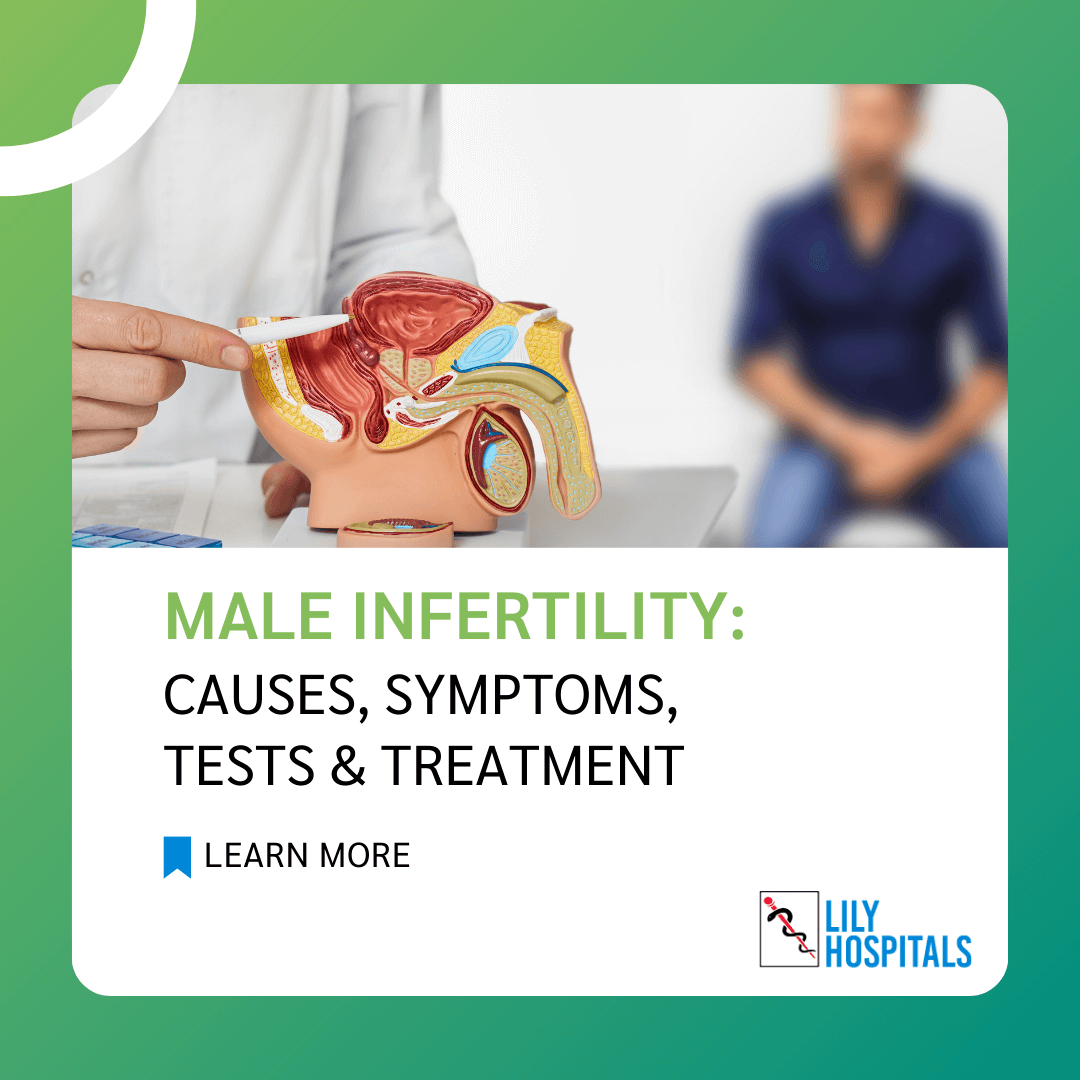
Overview
Infertility is a disease of the male or female reproductive system, defined by the failure to achieve a pregnancy after 12 months or more of regular unprotected sexual intercourse. It can cause significant distress, stigma, and financial hardship, affecting people’s mental and psychosocial well-being.
What is Male Infertility
Male infertility occurs when a man has a reduced ability to father a child. Various factors can lead to male infertility.
Biological factors include sperm-related issues such as malformed sperm, low sperm count (oligospermia), and absence of sperm in semen (azoospermia). Genetic disorders like Klinefelter syndrome and myotonic dystrophy can also contribute.
Another factor to consider is blockage in the sperm delivery system. This could be due to infections, surgeries, or congenital issues that obstruct the tubes carrying sperm.
Medical conditions such as diabetes, certain autoimmune diseases, and cystic fibrosis may affect fertility. Infections like epididymitis, orchitis, and sexually transmitted infections (STIs) including gonorrhea or HIV, can play a role.
Additionally, swollen veins in the testicles (varicoceles) and treatments for cancer—chemotherapy, radiation therapy, or surgical removal of the testicles (orchiectomy)—can be contributing factors.
Testicular trauma and hormonal disorders involving the hypothalamus or pituitary glands also impact fertility.
Environmental factors include exposure to radiation, toxins such as lead, calcium, pesticides or mercury, and lifestyle choices like tobacco, marijuana, or alcohol use.
Certain medications, including flutamide, spironolactone, and bicalutamide, can affect fertility.
Physical factors also matter. Spending time in environments that elevate the temperature of the testicles, such as saunas or hot tubs, using a wheelchair, long distance truck driving as a profession can increase infertility risk.
Lifestyle choices also play a role. Smoking, excessive alcohol consumption, and drug use can negatively impact sperm health. Additionally, obesity and a sedentary lifestyle can contribute to fertility issues.
Addressing male infertility often involves medical evaluation and lifestyle changes. Diagnostic tests include semen analysis, hormone testing, and imaging studies. Treatment options may range from medication and surgery to assisted reproductive technologies like IVF.
What Causes Male Infertility?
Male infertility can result from a variety of factors, many of which affect the production or function of sperm. Ensuring you understand these causes can help in identifying potential treatment options.
Hormonal Imbalances
Hormones play a crucial role in sperm production. Imbalances in hormones such as testosterone, luteinizing hormone (LH), and follicle-stimulating hormone (FSH) can disrupt the development and release of healthy sperm.
Genetic Factors
Certain genetic conditions, such as Klinefelter syndrome or Y chromosome microdeletions, can impair testicular function. These genetic issues often result in low sperm production or abnormal sperm.
Anatomical Issues
Structural problems within the male reproductive system can lead to infertility. Examples include blockages within the vas deferens or epididymis, varicocele (enlarged veins within the scrotum), and undescended testicles.
Lifestyle and Environmental Factors
Your lifestyle and environment can significantly impact fertility. Factors such as smoking, excessive alcohol consumption, drug use, exposure to toxins, and obesity can negatively affect sperm quality and quantity.
Medical Conditions
Certain medical conditions are known to affect male fertility. These include infections such as epididymitis or orchitis, chronic illnesses like diabetes, and surgeries that impact the reproductive organs.
Medications
Some medications can interfere with sperm production and function. Drugs used to treat cancer, certain antibiotics, and medications for hypertension may have adverse effects on fertility.
Age
Age can also be a contributing factor. Men over the age of 50 may experience a decline in sperm quality, which can affect their ability to father a child.
Sexual Health Issues
Issues such as erectile dysfunction or premature ejaculation can hinder the ability to conceive.
Read Also : What Is IVF?
Male Infertility Symptoms
- Difficulty with Ejaculation
You may notice trouble with ejaculating, including reduced volume of ejaculated fluid. - Pain and Swelling
Discomfort or swelling in the testicle area could indicate underlying problems such as testicular torsion or varicocoele. - Erectile Dysfunction
Difficulty in getting and maintaining an erection can point to fertility issues. - Decreased Facial or Body Hair
A decrease in hair growth might signal hormonal imbalances affecting fertility.
Affected Populations in Male Infertility
Age Groups
- Young Adults (20-35 years): This group might experience infertility related to harmful lifestyle factors such as smoking, alcohol use, or recreational drug use.
- Middle-Aged Men (36-50 years): Health issues like diabetes and obesity often start affecting fertility in this age range.
- Older Men (51 and above): Age can lead to decreased sperm quality and other age-related factors.
- Jobs Involving Heat Exposure: Occupations like welders or bakers, which expose individuals to high temperatures, long-distance truck driving, etc.
- Chemical Exposure: Workers in industries that involve handling pesticides or heavy metals.
Evaluating Male Infertility
- Semen Analysis: This test measures the quantity and quality of sperm. It looks at sperm count, motility (movement), and morphology (shape). You may need to provide a semen sample at a clinic or laboratory.
- Hormone Testing: Blood tests can check the levels of hormones that play a role in sperm production, such as testosterone and follicle-stimulating hormone (FSH).
- Scrotal Ultrasound: This imaging test checks the testicles and adjacent structures for abnormalities.
- Genetic Tests: These can identify genetic causes of infertility by analyzing your DNA.
- Anti-Sperm Antibodies Test: This detects antibodies that may attack sperm, hindering their ability to function properly.
- Post-Ejaculation Urinalysis: This checks for sperm in the urine, which may indicate retrograde ejaculation, a condition where sperm enters the bladder instead of being expelled.
Your healthcare provider may recommend additional tests based on initial results, so following their guidance is crucial.
Managing and Treating Male Infertility
Medical Therapy
- Hormone Treatments: Hormonal imbalances can impact sperm production. Medication to balance hormones such as FSH, LH, and testosterone can improve fertility.
- Antibiotics: Infections in the reproductive tract can contribute to infertility. Antibiotics can treat these infections but may not restore fertility if significant damage has occurred.
Surgical Interventions
- Varicocele Repair: Varicocele, which is the enlargement of veins within the scrotum, is a common cause of male infertility. Surgical procedures can remove or repair these veins to enhance sperm quality.
- Vasovasostomy and Vasoepididymostomy: These surgeries can reverse vasectomies or treat blockages in the vas deferens or epididymis, restoring sperm flow.
Assisted Reproductive Technologies (ART)
- Intrauterine Insemination (IUI): This technique involves placing concentrated sperm directly into the uterus during ovulation to facilitate fertilization.
- Intracytoplasmic Sperm Injection (ICSI): During ICSI, a single sperm is injected directly into an egg, which is then transferred to the uterus. This method is often used in conjunction with IVF.
- In Vitro Fertilization (IVF): Sperm and eggs are combined outside the body in a lab. Embryos formed are then implanted into the uterus.
Lifestyle Modifications
- Diet and Exercise: A balanced diet rich in antioxidants and regular physical activity can improve sperm quality and overall reproductive health.
- Avoiding Toxins: Reducing exposure to chemicals, smoking, and excessive alcohol can boost fertility.
Psychological Support
- Counselling and Support Groups: Infertility can be emotionally taxing. Accessing psychological support can help you and your partner cope with stress and emotional challenges.
Read Also : 16 Essential Tips For IVF Success
Prevention of Male Infertility
Maintaining a Healthy Lifestyle:
- Diet: Consume a balanced diet rich in fruits, vegetables, whole grains, and lean proteins.
- Exercise: Engage in regular physical activity to maintain a healthy weight.
- Avoid Harmful Substances: Minimize or avoid consumption of alcohol, nicotine, and recreational drugs.
Environmental Factors:
- Reduce Exposure to Toxins: Limit exposure to industrial chemicals, pesticides, and heavy metals.
- Heat Exposure: Avoid prolonged exposure to high temperatures, such as saunas or hot tubs, which can affect sperm health.
Medical Interventions:
- Regular Check-Ups: Schedule regular health check-ups to identify and address potential issues early.
- Medications: Use prescribed medications with caution and under medical supervision to avoid side effects impacting fertility.
Infections and STDs:
- Safe Practices: Practice safe sex by using condoms and getting regular screenings for sexually transmitted infections.
- Vaccinations: Stay updated with vaccinations to prevent infections that might affect reproductive health.
Preventive Health Measures:
- Testicular Health: Conduct regular self-examinations to detect lumps or abnormalities early.
- Stress Management: Employ stress-reduction techniques such as mindfulness, meditation, or therapy to improve overall well-being.
Occupational Hazards:
- Protective Gear: Use appropriate protective equipment if working in environments with potential reproductive hazards.
- Workplace Safety: Follow safety guidelines and regulations to minimize exposure to harmful substances.
Read Also: Female Infertility What is it?
Conclusion
Adopting a healthy lifestyle plays a crucial role in mitigating the risk of male infertility. Implementing the following strategies can be beneficial:
- Healthy Diet: Aim for a balanced diet rich in fruits, vegetables, whole grains, and lean proteins.
- Regular Exercise: Maintain physical fitness with consistent exercise routines.
- Avoid Smoking: Refrain from smoking, as it harms sperm quality.
- Limit Alcohol: Consume alcohol in moderation.
- Manage Stress: Practice stress-relieving activities such as yoga, meditation, or hobbies.
- Regular Check-ups: Schedule regular health check-ups to monitor fertility health.
Consult with healthcare professionals for personalized advice and treatment options if facing fertility issues.
Frequently Asked Questions
What are the signs and symptoms of male infertility?
Male infertility can present with a variety of symptoms. The most common are:
- Low sperm count
- Difficulty ejaculating
- Erectile dysfunction
- Pain or swelling in the testicular area
- Hormonal imbalances
Which treatments can help with male infertility?
There are multiple treatments available for male infertility, including:
- Medications to address hormonal imbalances or infections
- Surgical interventions for blockages in the reproductive tract
- Assisted reproductive technologies, such as IVF or ICSI
- Lifestyle changes to improve overall health
What are the main reasons for male infertility?
The primary causes of male infertility include:
- Varicocele (enlarged veins in the testes)
- Infections that impact sperm production or function
- Genetic disorders affecting sperm production
- Hormonal imbalances
- Exposure to environmental toxins
Are there types of male infertility, and what are they?
Yes, male infertility can be categorized into different types:
- Pre-testicular infertility: Involves hormonal imbalances or dysfunction of the hypothalamus or pituitary gland
- Testicular infertility: Direct issues with the testes affecting sperm production
- Post-testicular infertility: Problems with the sperm’s ability to travel or be ejaculated
Is male infertility permanent?
Male infertility can sometimes be a temporary condition. It depends on the underlying cause:
- Hormonal imbalances or infections may be treatable
- Structural issues may require surgery
- Lifestyle changes can also lead to improvements
How can male infertility be managed or treated?
Effective management or treatment options include:
- Medications for hormonal treatment or infections
- Surgery for varicocele or blockages
- Assisted reproductive technologies like IVF or ICSI
- Lifestyle changes such as diet, exercise, and avoiding harmful substances
Which foods or drinks should be avoided if you have male infertility?
To improve fertility, you might want to avoid:
- Foods high in trans fats
- Excessive alcohol consumption
- Caffeine in large amounts
- Processed meats and high-fat dairy products
- Foods with high levels of pesticides or contaminants
Proper nutrition can support reproductive health and increase the likelihood of successful treatment.


